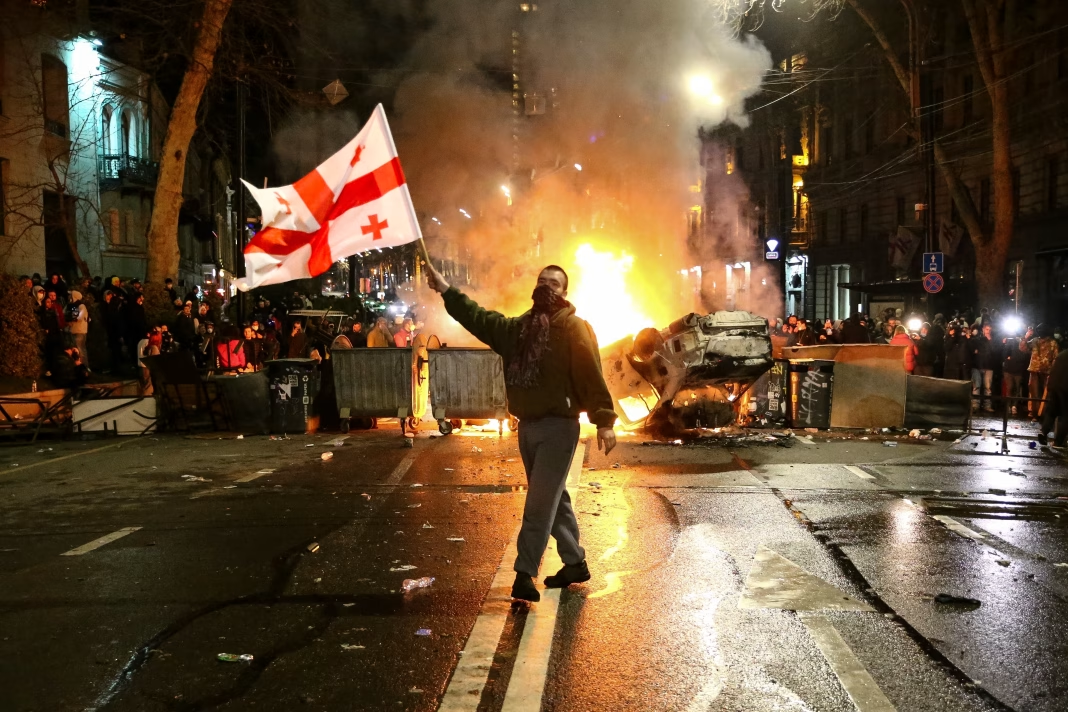Recent protests have erupted in Georgia, with tens of thousands of demonstrators filling Tbilisi’s historic Rustaveli Avenue. Waving the national flag and clashing with riot police, the protesters are voicing their outrage over the ruling Georgian Dream party’s decision to suspend talks on European Union membership.
This move has sparked accusations from opposition groups that the ruling party is succumbing to Russian influence, further distancing Georgia from the West.
The protests come on the heels of the controversial “foreign agent law” passed by the Georgian Parliament earlier this year, which critics argue mirrors Russia’s repressive legislation against independent media, civil society organizations, and political dissent.
Footage from Tbilisi shows violent clashes between protesters and police, with riot control measures such as tear gas and water cannons deployed in an attempt to disperse the crowds. A fire broke out in the Georgian Parliament building after protestors threw incendiary objects, leading to at least 42 injuries among police officers.
The United States has expressed support for the demonstrators, condemning the use of excessive force by Georgian authorities. More than 200 protesters have been arrested since the unrest began.
Why the Protests Matter: Political Tensions and Russian Influence

The protests began after the Georgian Dream party, which has been in power since 2012, announced that it would suspend its European Union accession talks until 2028. This decision has been widely interpreted as a shift away from the EU and toward closer ties with Russia, a concern for many Georgians who see membership in the EU as a path to greater security and economic stability. The move comes at a time of heightened geopolitical tensions in the region, as Russia’s war in Ukraine continues to impact neighboring countries.
Georgia, a former Soviet republic located at the crossroads of Europe and Asia, has long harbored aspirations to join the European Union. Despite its strategic location, the country remains under the shadow of Russian influence, with approximately 20% of its internationally recognized territory under Russian control. Public support for EU membership remains high, with recent surveys showing that nearly 80% of Georgians favor joining the bloc.
The Geopolitical Stakes: Why Georgia Wants to Join the EU

Georgia’s aspirations for EU membership are rooted in security concerns and a desire for greater integration with Western democracies. Joining the EU would offer Georgia access to economic assistance, increased trade, and enhanced security through the EU’s collective defense agreements. This is particularly important in the context of Russia’s ongoing aggression in Ukraine and memories of Georgia’s 2008 war with Russia, which resulted in significant civilian casualties and territorial losses.
In addition to security benefits, EU membership would also align Georgia with Western values such as free speech, human rights, and democratic governance—principles many protestors believe are under threat from the ruling Georgian Dream party. The growing economy and international standing of Georgia would also benefit from closer ties to the EU, providing access to financial aid and trade opportunities that could help strengthen the nation’s development.
As protests continue to unfold, the situation in Georgia is drawing international attention, with global leaders urging the government to respect citizens’ rights and consider the long-term implications of its decisions on the country’s future.
Discover more from LN247
Subscribe to get the latest posts sent to your email.


